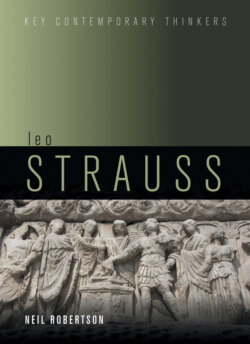Читать книгу Leo Strauss - Neil G. Robertson - Страница 10
The Return to Natural Right
ОглавлениеAs a young man, Strauss was deeply struck by Nietzsche’s characterization of the contemporary western world as an age of nihilism. Strauss accepted Nietzsche’s account of the self-destruction of reason that produced nihilism as a loss of all moral meaning. The modern world seemed incapable of discerning truth, above all moral and political truth. Strauss’s “change of orientation” in the early 1930s was a movement away from Nietzsche made possible by Strauss’s recognizing that it was only modern rationalism that was in trouble; pre-modern rationalism could be recovered in order to develop a standpoint without the nihilistic implications of modernity. Further, what pre-modern rationalism allowed was a return to “nature” as a standpoint or standard that would allow the recovery of moral content and moral meaning. Hence the recovery of what Strauss calls “natural right” – Strauss’s way of translating the ancient Greek phrase physei dikaion, or “what is just or right by nature.” If there could be the recovery of a standard of right or justice based upon nature and so independent of history – including the history of modernity – then the apparent victory of modern philosophy over ancient philosophy needed to be reconsidered.
For Strauss, the most developed form of the modern project that ended in nihilism was “historicism,” the belief that all human thought and meaning is historically determined and historically limited. Historicism meant that nothing could be said to be simply true or good because, from a historicist perspective, truth and goodness were historically relative. The promise of the recovery of “natural right” was the promise of the recovery of a standard that was not historically relative, but true or good by nature. For Strauss, natural right is what emerges when the power of historicism recedes as it recognizes its nihilistic character. The great benefit of returning to ancient Greek philosophy, above all as shown in the figure of Socrates, is the remarkable fact that there could be the discovery of natural right as an object of philosophical inquiry. It was this insight that was made available to Strauss in his “change of orientation,” and was to determine the standpoint of his subsequent thinking.
